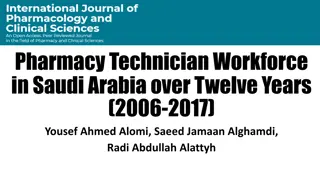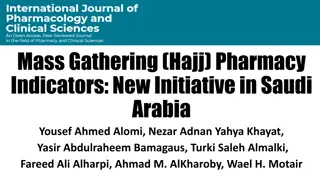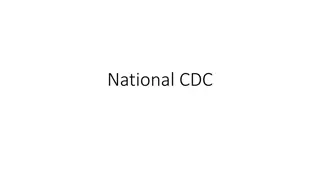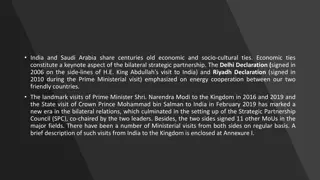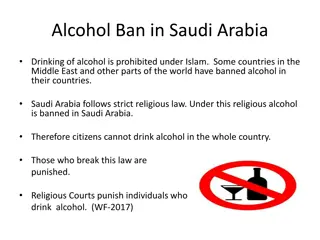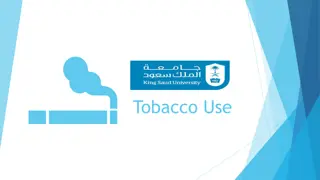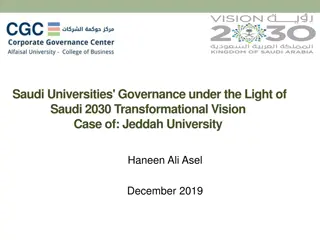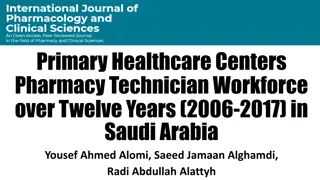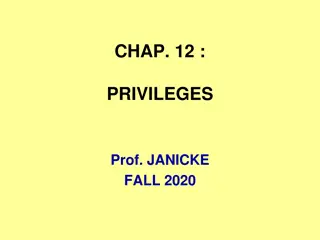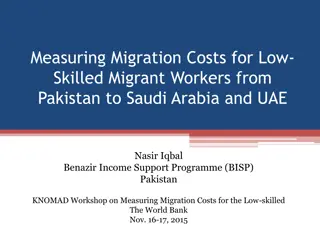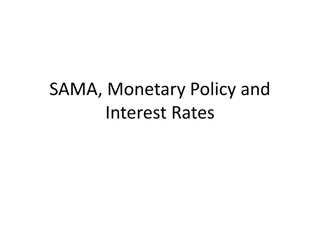Clinical and Administrative Privileges of Pharmacists in Saudi Arabia
A study was conducted to explore the clinical and administrative privileges of pharmacists in Saudi Arabia. The research highlighted the average scores of pharmacist privileges, clinical privileges, and administrative privileges in hospital pharmacy programs. Findings suggested that there is room for improvement in establishing and updating policies to enhance pharmaceutical care implementation in the Kingdom of Saudi Arabia.
Download Presentation

Please find below an Image/Link to download the presentation.
The content on the website is provided AS IS for your information and personal use only. It may not be sold, licensed, or shared on other websites without obtaining consent from the author. Download presentation by click this link. If you encounter any issues during the download, it is possible that the publisher has removed the file from their server.
E N D
Presentation Transcript
Privileges of Pharmacist in Saudi Arabia: Clinical and Administrative Activities Faisal Al-Otaibi, Mohamed Soliman Imam, Randa Mansour Abdel-Sattar Ahmed, Amsha Alotaibi, Asma Alotaibi, Amal Alotaibi, Wesam Alsuwaid, Yousef Ahmed Alomi
Objectives: To explore the privileges of pharmacists through the clinical and administrative activities in Saudi Arabia. Methods: This is a 4-month cross-sectional survey regarding clinical and administrative privileges of pharmacists in Saudi Arabia. The study consisted of two parts: the first part collected demographic information and the second part comprised a questionnaire with 28 questions divided into 4 domains. The questions were derived from previous literature and from the regulatory standards of the American Society of Health-System Pharmacists (ASHP). The four domains were as follows: privilege management and resources, pharmacist prescribing and therapeutic interchange, clinical and administration privilege and drug monitoring and healthcare education. The responses were obtained using a 5-point Likert response scale system with close- and open-ended questions. The survey questionnaire was distributed in an electronic format to the director of pharmacy of each hospital in Saudi Arabia. In this study, we analyzed pharmacist s privilege in Saudi Arabia with regard to the clinical and administrative activities. All data were obtained through the Survey Monkey system.
Results: The survey was distributed to 36 hospitals. The average score of pharmacist privilege in the hospital pharmacy practice program was 3.16 (63.13%). Most of the pharmacy practice programs having pharmacist privilege were nonformulary requests (3.69 (73.8%)), patient counseling (3.60 (72%)) and medication errors preventing and monitoring (3.58 (71.6%)). The average score of clinical privilege for a pharmacist was 2.95 (58.97%). The maximum score of clinical privileges for a pharmacist were to answer questions from all healthcare professionals (3.83 (76.6%)), to decrease drug dosing (3.47 (69.4%)) and to change drug strength (3.4 (68%)). The average score of pharmacist administration privilege was 3.14 (62.75%). The administration privileges for pharmacists were to conduct educational courses (3.81 (76.2%)) followed by to setup vision and mission (3.71 (74.20%)) and to conduct training programs (3.64 (72.80%)). Conclusion: The clinical and administrative privileges of a pharmacist is not well established in the Kingdom of Saudi Arabia. Most of the clinical and administrative privileges were regular and primary duties. Therefore, it is important to update the policies and procedures of clinical and administrative privileges given to a pharmacist with more engagement in the pharmacy practice. These practices are highly recommended in order to improve pharmaceutical care implementation at hospitals in the Kingdom of Saudi Arabia.
KEYWORDS Privileges, Pharmacist, Clinical, Administrative, Activities, Saudi Arabia.
The clinical and administrative privilege of a pharmacist in Saudi Arabia was not optimum in practice. Majority of the clinical and administrative privileges of a pharmacist were found to be basic and common practice duties. Therefore, it is highly recommended to establish clinical and administrative privileges for pharmacists in order to improve patient care and implement the quality management standers as part of the accreditation process of healthcare organizations. The implementation of pharmacist privilege of clinical and administrative pharmacy is highly required in the KSA.


